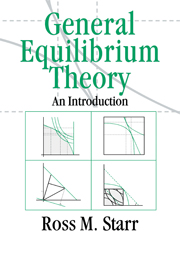Book contents
- Frontmatter
- Contents
- List of illustrations
- Foreword
- Preface
- Table of notation
- A Getting started
- B An economy with bounded production technology, supply and demand functions
- C An economy with unbounded production technology, supply and demand functions
- D Welfare economics
- E Bargaining and equilibrium: The core
- F The scope of markets
- G An economy with supply and demand correspondences
- H Conclusion
- Bibliography
- Index
A - Getting started
Published online by Cambridge University Press: 05 June 2012
- Frontmatter
- Contents
- List of illustrations
- Foreword
- Preface
- Table of notation
- A Getting started
- B An economy with bounded production technology, supply and demand functions
- C An economy with unbounded production technology, supply and demand functions
- D Welfare economics
- E Bargaining and equilibrium: The core
- F The scope of markets
- G An economy with supply and demand correspondences
- H Conclusion
- Bibliography
- Index
Summary
Two elegantly simple and insightful models of general equilibrium (simultaneous price-guided clearing of several goods markets) are simple enough to introduce in elementary classes and rich enough to provide insights in advanced treatments. These are
the Robinson Crusoe model, which emphasizes the interaction of the consumption and production sides of the economy and
the Edgeworth box, which investigates bargaining and equilibrium in the exchange of commodities among consumers.
We present these models in Chapter 1. In addition, the chapter includes a sample proof of existence of market general equilibrium, describing the structure of demand and supply functions needed to establish that prices can adjust so that markets can clear.
Chapter 2 presents an introduction to real analysis, the athematics needed to pursue the mathematical general equilibrium theory. Two topics that are particularly prominent in the general equilibrium theory get special emphasis: the Brouwer Fixed-Point Theorem and separation theorems for convex sets. We present a combinatorial proof of the Brouwer Theorem, a proof that requires patience and attention more than mathematical sophistication. In addition, we present statements and proofs of the bounding and separating hyperplane theorems, theorems that are essential in the study of welfare economics (Chapter 12) and the core of an economy (Chapters 13 and 14).
- Type
- Chapter
- Information
- General Equilibrium TheoryAn Introduction, pp. 1 - 2Publisher: Cambridge University PressPrint publication year: 1997



